- Home
- Sarah Hawkswood
Faithful Unto Death Page 2
Faithful Unto Death Read online
Page 2
‘I fear his soul departed some days past, Father,’ grunted Catchpoll.
‘No matter. His mortal remains are at least to be interred in consecrated ground, and if he died with his sins still upon him, then we will pray the more assiduously for that soul.’
The shrieval party withdrew to the nave, where the smell was less strong, and the priest intoned prayers for the dead. At their conclusion he came to them.
‘Father, we do not know if this man was a traveller, waylaid upon the road, nor even from which direction he might hail. The reeve here has said he is unknown to the village, but as undersheriff I ask him and you both, are there any of Cotheridge who might be capable of this deed?’
‘None, my lord Undersheriff. I have served this community for the better part of forty years and baptised the majority of my congregation. Man is sinful, and Satan may drag one into the Pit, but to kill a man and steal from his body is not the act of sudden rage or evil. If you had said might any steal an egg or two, or take a roebuck, then honesty would have me say it was possible, but not this crime, not with these folk.’
Godwin the Reeve nodded, his expression solemn.
‘To say none could commit a crime would be foolishness, but I agree with Father Wulstan. No man in this village would kill a man like this, not a cold-blooded crime.’
‘Thank you, both of you. It is not an unexpected answer, but useful, nonetheless. If we discover the man’s identity, you will be told, as will Father Prior in Worcester, where I know prayers will also be offered. We would also know,’ Bradecote continued, ‘if any villager here saw a man upon a horse, and leading another saddled horse, these past few days. We will not go to the fields and interrupt the haymaking, but ask today and send report − whether yea or nay − to the castle.’
The sheriff’s men looked towards altar and corpse, and genuflected, crossing themselves, and then, with a nod to reeve and priest, went out into the warm sunshine and clear air, where the birds had yet a few hours of song within them. They took lungfuls of sweet summer air, mounted their horses, and Bradecote took the road direct towards Worcester, whilst Catchpoll and Walkelin cantered back past the coppice and Hundred boundary, to ask their questions in Broadwas. They rejoined Hugh Bradecote awaiting the ferry across the Severn into Worcester, the tide being too high for fording, and with no positive news.
‘That, I am sorry to say, is all we can tell you, my lord, and how you wish to apportion the murdrum …’ Bradecote left that hanging. He stood, with Catchpoll one pace to his rear, in the castle hall.
‘I see.’ William de Beauchamp leant back, a half-smile upon his face. ‘Which means you think you can take your lady back to Bradecote and see your hay cut.’
‘Well, my lord, we can see no further in this. That is it, unless such a man is reported missing, and even then who killed him is likely to remain hidden.’
‘I hate to disappoint your lady, but she will be going home alone, Bradecote.’
‘She will?’ Bradecote looked startled, and Catchpoll sucked his teeth. Trust de Beauchamp to keep his own counsel until the end.
‘I think so. You see, I have received a message from Robert of Gloucester, shortly after you left. The noble earl wishes to know if I have given hospitality this last week to a messenger from the Prince of Powys. He was expecting one to arrive in Gloucester, and he has failed to do so.’
Catchpoll made an unhappy growling noise and spat into the rushes upon the floor. De Beauchamp’s own inclination was for the Empress not King Stephen, and he was now thus allied with the lady’s bastard brother and chief supporter, Earl Robert of Gloucester, whilst still taking his due for collecting King Stephen’s taxes and administering his laws. The earl’s name was not popular in Worcester. Only five years ago he had come and fired the town because it had been given to Earl Waleran de Meulan, who was then fighting for the King. There had been no deaths, for there was some warning of the catastrophe, and the people of Worcester had taken what mattered most to them in chattels and crowded into the sanctuary of the cathedral as the flames took home and business. The only good thing was that there had been not a breath of wind, and before evening a steady rain fell that limited the damage so that some premises remained and others were not in total ruination. Despite this, many had been forced to take shelter with kin or more fortunate neighbour, and rebuilding had taken some months.
‘You think the dead man was this messenger, my lord?’ Bradecote rubbed his chin. ‘Well, it depends upon what sort of messenger Madog ap Maredudd sent, but if it was a man of status … It would fit, although I would have thought he would have taken the Hereford route rather than coming this side of the Malverns. If we but knew his description …’
‘Which is why I am sending you to find out.’ De Beauchamp noted the increasing unhappiness of his serjeant. ‘And I care not how little you like the Welsh, Catchpoll.’
‘It complicates matters, my lord,’ declared Catchpoll, grimly. ‘We have a dead man, killed for perhaps what he had of value in coin, or what he was, or had done, but this adds the possibility that he was killed for the message itself, and that is politics, my lord.’ He said the word as if it were black witchcraft.
‘True, Catchpoll. But if Earl Robert wants to know what happened to that messenger, I would like to tell him, even if I say he is dead. That knowledge might give him help or hindrance, I know not which, and have meaning to him.’
‘And if the man is proved Welsh, does the murdrum fine stand? He would not be proved English, but he would not be Norman “foreign”.’ Bradecote was thinking of unwilling witnesses.
‘A fine is useful coin in hand, Bradecote.’
‘Indeed, my lord, but witnesses might be more forthcoming without the threat of losing coin from their own hand.’
‘Ah, I see what you mean. Well, I would happily forego it if the crime were thus solved. Yes, encourage tongues with that, on your way back from Mathrafal. You ought to be able to reach the monks at Leominster by tonight if you leave within the hour, and the night thereafter you can take your meat at Bishop’s Castle, or Ludlow if you make slower progress. I will give you a letter for the constables there.’
‘Er, and what about when we get to Mathrafal, my lord? We do not speak Welsh.’
‘What man in his right mind would, barring a Welshman? The prince is bound to have someone who speaks a language you can understand, and at worst Latin. Just be polite, and remember it may be a pisspot of a realm, but he is royalty.’
‘Then should you not g—’ Bradecote saw the sheriff’s lips compress and thought better of the suggestion. ‘Very well, my lord, within the hour. I would have an escort for my lady, though.’
‘One will be provided, I promise you. Now, give her your news, and make your preparations.’
‘I am sorry, Christina.’ Hugh Bradecote took his wife’s hands in his own.
‘I am married to the Undersheriff of the Shire. Such things must be, but have a care, my love, in Wales.’
‘Do not tell me you have a dread of it like Catchpoll?’ He smiled at her.
‘Not a dread, no, but where people can be open with each other and yet closed to you, much that goes on may be hidden, and if this man was killed by one who followed from that court …’
‘I shall have a care, fear not. Now, de Beauchamp has promised me an escort for you back to Bradecote. Take it, and tell Thurstan the Steward that if the weather holds, I want the hay brought in next week.’
‘Yes, my lord.’ She dimpled, and dipped in a curtsey, from which he pulled her up and into his arms.
It could not be said that Mistress Catchpoll was as sanguine, when Catchpoll was gathering spare raiment, and a large oiled cloth.
‘Wales?’ She sounded amazed.
‘Do not you start upon that also. I know, I swore I would never go there, but this is at the lord Sheriff’s command, so I has no choice in it.’
‘Why must all of you go? Why not send just the lord Bradecote?’
‘Why? T
o watch his back, of course. You cannot trust anything Welsh, the weather, the tongue, nor the princes neither.’
Mistress Catchpoll pursed her lips. Her husband’s vocal and violent objection to Wales had been known to her since before they were wed, but the cause of it had remained secret all these years, and she had no expectation of it being disclosed now. Her advice sounded remarkably like that of the lady Bradecote.
‘Well, have a care. You will need all your wits and more if they say one thing to him, and another to each other.’
‘Aye, but I “translate” faces better than most. Whatever the twisting of the tongue, I will know if they speak God’s good truth or Welsh lies.’
‘Then Godspeed, and mind you do not sleep with wet feet.’
With which prosaic advice, Mistress Catchpoll kissed him upon the cheek, and sent him upon his way.
Chapter Two
Walkelin wore a smile of anticipation for the first five miles, until Catchpoll threatened to wipe it from his visage with the back of his hand. He had never been as far north as Ludlow, which he had heard possessed a fine position and a castle of impressive strength. He thought he had been into Wales, having crossed the Wye as a man-at-arms when William de Beauchamp had visited some kinsman, and there were certainly people there who spoke Welsh, but in truth he was not quite certain whether having a Norman overlord made it England. It felt better to say he had been somewhere ‘different’ though, and his mother had been impressed. Eluned, the servant girl in the castle kitchens, had merely giggled when he told her of his adventure, but that might have been because he was trying to kiss her at the same time.
His companions were not smiling. Hugh Bradecote was trying to work out how to ask questions without upsetting royalty, and Catchpoll was ruminating upon having to cross the border into Wales.
They crossed the Hundred boundary without so much as a glance into the coppice upon their right-hand side. The corpse would be shrouded by now, even if none were available to dig the good earth before eventide, and before the sun was well risen on the morrow the body would be buried. Summer was not a time to leave the dead above ground. Having learnt all that they could from ‘our friend’, his physical remains were of no further use, and were cast from mind. It was one of the things that Catchpoll advised, and both his superior and apprentice had learnt swiftly, ‘for dwelling upon them as we cannot bring back mars thinking how to catch them what did for them’.
‘You realise also we will be too late to eat when we reach Leominster Priory,’ grumbled Catchpoll.
‘Then we pay good coin for bread and ale when we pass through Bromyard.’ Bradecote was not going to let Catchpoll wallow in his morose mood for the entire journey, lest it dull his ‘serjeanting’ senses. ‘All we need is a bed for the night and a break of fast in the morning.’
‘Should we be asking about our dead man along this road, my lord?’ enquired Walkelin.
‘We have little enough to go upon, and if we ask all upon the road, we will not get the bed. Better we ask once we have found out if our victim is this Welsh envoy, when we might have a name, a horse described, and details of his companion, if he had one.’
‘And if he is not?’
‘In truth, we can report to the lord Sheriff, and thence to Earl Robert of Gloucester that it was not a messenger to him, whereupon important people lose interest, and with a crime so old and a nameless corpse, we leave justice to God alone.’ Experience was making a cynic even of Hugh Bradecote, of which Catchpoll approved.
‘But—’
‘If you start a-thinking that every death can be paid for, you will drive yourself mad as a hare in spring, young Walkelin. The lord Undersheriff is right. We do what we can, the best we can, but this crime was mayhap four or five days old when we saw the corpse, and every day after that makes it harder.’
‘But we found who killed the horse dealer of Evesham.’ Walkelin frowned.
‘Aye, we did, and against the odds, in my view, but we got a name and he was not far from home. Since most men know who does for ’em, that was a great help. If this man remains nameless, we have no place to ferret, no kin to gain from his death, or lose by it.’
‘But if he is the Welshman?’ Walkelin now hoped this was the case.
‘He might well have stopped at Leominster Priory himself, of course,’ suggested Catchpoll. ‘Welshmen, of the grander sort, are not so common they would not be noted, and if he stayed the night, they would have spoken with him and known his origin. That would give us a day on which he was alive, and a direction.’
‘Where else would he stay if coming from Mathrafal?’ Bradecote settled his horse, as it shied from a partridge flying up by the trackway. ‘He would either come through Shrewsbury and down to Ludlow, or across as we go, past Bishop’s Castle, and either route brings you to Leominster, if he was found between there and Worcester.’
It was, as Catchpoll had anticipated, after Compline, when the three sheriff’s men rode into Leominster. On a summer eve, when travellers made good use of the day, however, Brother Porter was excused the first night offices, and remained until the sun dipped in the heavens before taking to his cot. For late arrivals, he acted as guest-master, and bade them a cheery welcome, and even, when their rank and role was declared, disappeared to bring them beakers of small beer to slake the dust from their throats. He was round of face and body, and clearly found the world, sinful as it was, a place full of joys.
‘Tell me, good Brother, have you had a Welshman, a man of substance, and probably with at least one retainer, take advantage of your hospitality this last week?’
‘Of a certainty, no, my lord. I see all who come and go, and if I missed the one, then I catch the other. We have had a Flemish wool merchant, some pilgrims upon their way to the shrine of St Oswald at Gloucester, and a widow bringing her son to give to God’s service here. No Welshman, of whatever rank, has entered the enclave.’
There was no reason why the Benedictine should tell them false, but it muddied matters. Of all the resting points along the potential route, this was the one that was common, this was the one where the man must surely have stopped.
‘No sense to it, no sense at all,’ sighed Catchpoll, as he rubbed down his horse in the stable. He would not hear of the lord Bradecote seeing to his own mount, and had designated Walkelin to see the animal fed, watered and stalled, but the undersheriff had remained in the horse-smelling warmth, leaning against a stall post, arms folded.
‘There is nowhere likelier, even if he turned to the Worcester road upon a whim, instead of going down through Hereford, and it is a steady day’s ride to Ludlow, or Bromfield, if you want to conserve your horse, and he would, for it had to get him to Gloucester and back. To go further, well, you would be hard-pressed to reach anywhere else without riding at pace.’
‘Unless he knew a place of old,’ offered Walkelin.
‘But he was Welsh,’ snorted Catchpoll, and sneezed.
‘Even Welshmen may have kindred in England. Look at the castle in Worcester. There is Nesta, the cook’s wife, and Walkelin’s wench.’ Bradecote tried to find a reason.
‘If that is so, we may yet find ourselves upon our return journey stopping every few miles to ask if anyone has Welsh kin. Holy Virgin save us from that.’ With which Catchpoll crossed himself, and then spat into the dusty straw.
Brother Porter made sure that Father Prior knew of his important guests, however transient, and their departure next morning was delayed a little whilst the cleric made a gentle fuss of them, and made much of the new buildings in what was a very young house, an offshoot of Reading.
‘What he hoped for was more than a gift for a night’s lodging,’ remarked Catchpoll, sapiently, as they trotted away.
‘Well, if he thought I was wealthy he was sadly mistaken,’ replied Bradecote, with a wry smile. ‘We had a good harvest last year, and there are no rumbling bellies in Bradecote, or my other holdings, but the surplus was not such that I have bounty to dispense to new laid sto
ne.’
‘Reading cannot be poor, after what the old King did for it, and this daughter house does not look as if it is suffering. Treasuries always wants more treasure, be they royal coffers or the Church, and think everyone else should provide it.’ Catchpoll sniffed.
Walkelin, whose relationship with silver pennies was tenuous, since any time he was paid his mother took the coin from him to keep it ‘safe’ and keep him from ‘alehouses and whores’, had lost interest, and was thinking about their victim.
‘We need to think backwards, or rather forwards.’
‘What?’ Catchpoll cast him a look which questioned his wits.
‘If it was a Welsh envoy, how far could he have got on his first day, assuming he set off in a morning?’
‘Which has itself to be only a good guess,’ Bradecote reminded him, ‘and there is a huge difference between what a man might choose to do, what a man could do, and what he might be asked to do, in a day. Even the weather would affect it, and we had those summer storms scarce over a week back. My steward was worried about the hay.’
‘We have too many unknowns, lad. Give us a few things as fact and we can make good guesses, but at present, you will make your head spin to no good purpose,’ Catchpoll advised.
The day grew hot, and their pace, perforce, slackened. Where there was dappled shade there was some relief, but even there the air was still and heavy, smelling of warm leaf litter, and in the open the sun was merciless. They climbed the hill into Ludlow about noon, and went first to the castle, where, within the cool of thick stone walls, Bradecote made enquiry, in case the Welsh messenger had been foolish enough to come into contact with the King’s supporters there, or had been reported to them. As expected, he learnt nothing, but was offered meat and wine, and it gave them the chance to rest for the noontide hour before pressing on to Bromfield. William de Beauchamp had given them a note of introduction for the castellan of Bishop’s Castle, but both undersheriff and serjeant were already doubting that they could make that far in the conditions.

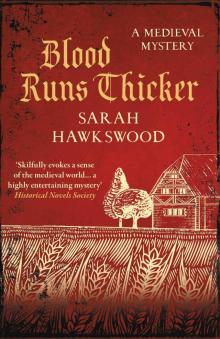 Blood Runs Thicker
Blood Runs Thicker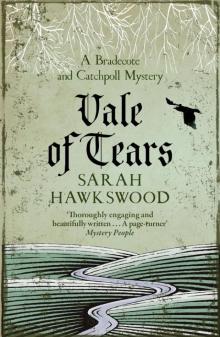 Vale of Tears
Vale of Tears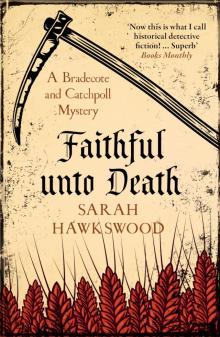 Faithful Unto Death
Faithful Unto Death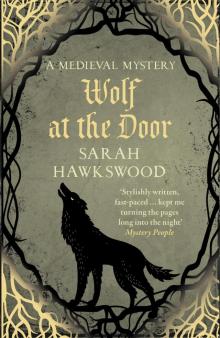 Wolf at the Door
Wolf at the Door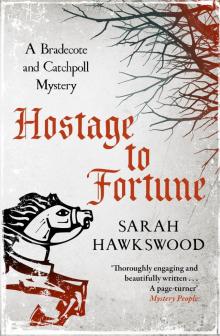 Hostage to Fortune
Hostage to Fortune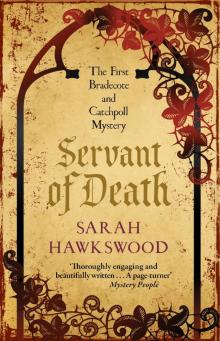 Servant of Death
Servant of Death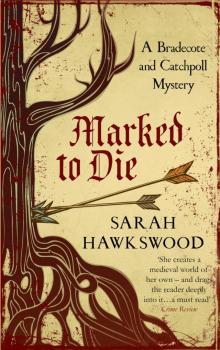 Marked to Die
Marked to Die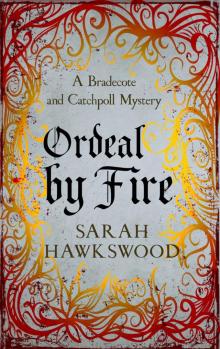 Ordeal by Fire
Ordeal by Fire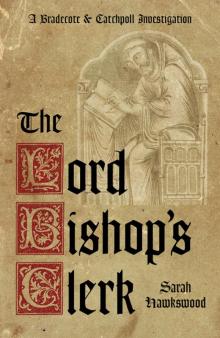 The Lord Bishop's Clerk
The Lord Bishop's Clerk